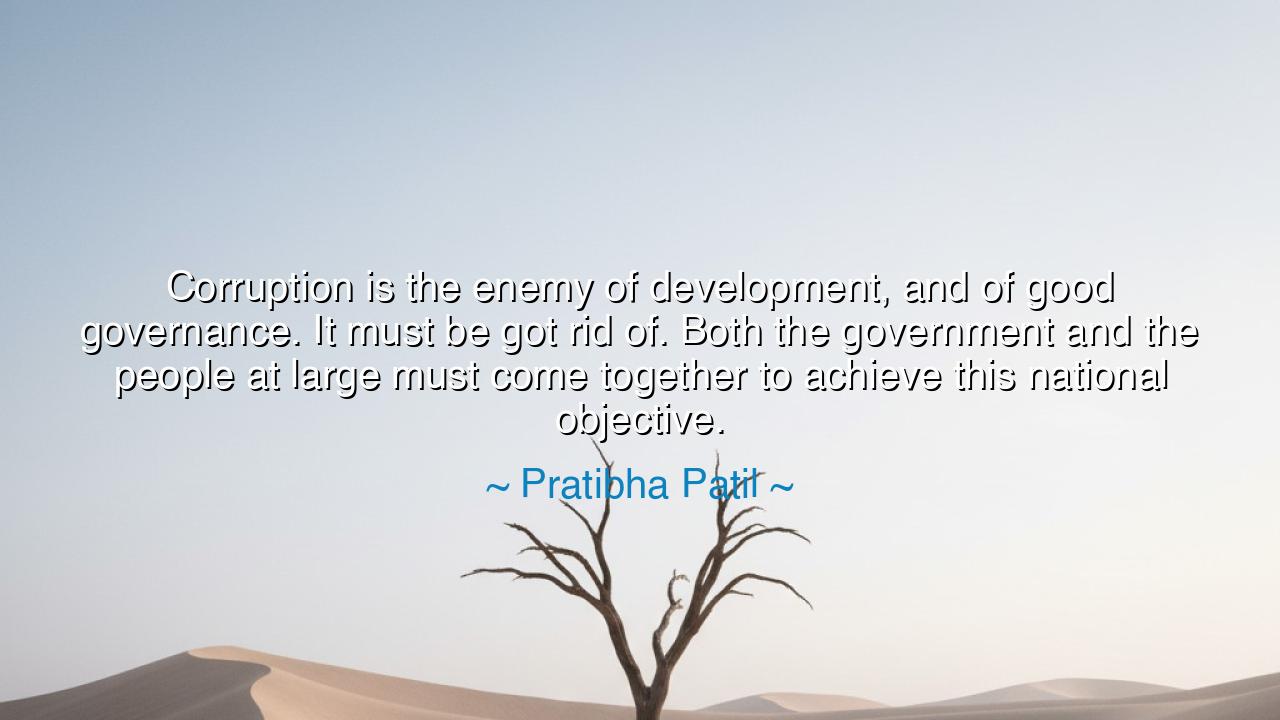
Corruption is the enemy of development, and of good governance.
Corruption is the enemy of development, and of good governance. It must be got rid of. Both the government and the people at large must come together to achieve this national objective.






When nations rise from the ashes of poverty and ignorance, seeking to build pillars of justice and prosperity, there is one shadow that follows them all — corruption. It creeps through halls of power and whispers in the ears of those who have forgotten virtue. It poisons trust, mocks law, and devours progress. Against this darkness, Pratibha Patil, the first woman to serve as President of India, declared with unwavering resolve: “Corruption is the enemy of development, and of good governance. It must be got rid of. Both the government and the people at large must come together to achieve this national objective.” These words are not merely political counsel; they are moral scripture — a reminder that the decay of a nation begins not in its soil, but in its conscience.
The origin of this quote lies in Patil’s public addresses during her presidency, particularly in her calls for ethical governance in a rapidly developing India. At a time when economic growth surged and opportunity expanded, she saw the hidden rot beneath the surface — the quiet theft of public wealth, the manipulation of power, the erosion of integrity. She knew that corruption is not simply the taking of bribes or the hoarding of gold; it is the betrayal of trust, the breaking of the sacred bond between ruler and ruled. Her message was born from the wisdom that no amount of policy or prosperity can endure if built on dishonesty. To her, good governance was not a matter of clever administration, but of character — and it was a duty shared equally by the people and their leaders.
Throughout the ages, the wisdom of her words has been proven again and again. In the golden age of Athens, the philosopher Solon laid down laws to restore order and fairness among the people. Yet even he warned that when officials become corrupt, laws are but empty parchment. Centuries later, the mighty Roman Empire, master of the world, crumbled not from foreign invasion, but from the corruption of its own heart — senators who bought favor, generals who sold loyalty, citizens who traded virtue for comfort. What armies could not do, corruption accomplished. For when the guardians of justice grow greedy, and when the governed grow silent, the house of civilization falls into ruin.
Patil’s insight is not confined to politics; it is a reflection on the nature of the human soul. For corruption begins not in palaces, but in hearts — when men and women, tempted by ease or fear, forget that honesty is the foundation of all progress. A society cannot be purified by punishment alone; it must be reborn through a shared sense of duty. That is why she called not only upon government, but upon the people at large, for no law can compel integrity, and no institution can replace conscience. It is only when citizens demand righteousness, and when leaders embody it, that corruption can be defeated. The war against it must be fought in every office, every school, every home — in every decision where truth competes with convenience.
History offers shining examples of those who heeded such a call. Consider Mohandas Karamchand Gandhi, who, long before India gained her independence, declared that freedom without virtue would be meaningless. He refused gifts, spurned luxury, and made of his life a living rebuke to greed. In one tale, a poor farmer once offered him money for the cause, but Gandhi returned it, saying, “Give from your heart, not your fear.” His revolution was not of violence, but of moral courage — a reminder that corruption is not conquered by decree, but by discipline. When a people learn to prefer honesty to advantage, and service to power, they become ungovernable by corruption.
And so, Patil’s words carry a timeless challenge. To say that corruption is the enemy of development is to understand that development itself is not measured in buildings or roads, but in trust. A nation may have wealth, but without integrity, it has no strength. It may have technology, but without virtue, it has no soul. A country that tolerates corruption weakens itself from within, for every dishonest act, every bribe accepted, every truth ignored, becomes a stone removed from the foundation of democracy. The fight against corruption is not an act of politics — it is an act of patriotism, an offering to the spirit of the nation itself.
The lesson, then, is clear: to destroy corruption, both government and people must rise together — not in outrage alone, but in transformation. Let leaders lead by example, serving not for gain but for the common good. Let citizens refuse to sell their conscience for convenience or fear. Let honesty become the new patriotism, and transparency the new law of the land. For when the people are pure, the government cannot remain corrupt; when the hearts of citizens shine with truth, the darkness of deceit has nowhere to hide.
So remember the wisdom of Pratibha Patil, whose words echo like a call to arms for the spirit: “Corruption is the enemy of development, and of good governance.” If we would build nations that endure, we must build first the character of those who inhabit them. Let each person become a guardian of honesty, a soldier of conscience, a keeper of the nation’s soul. For the health of a country lies not in its gold, but in its goodness — and when integrity reigns, prosperity will follow like dawn after the long night.






AAdministratorAdministrator
Welcome, honored guests. Please leave a comment, we will respond soon